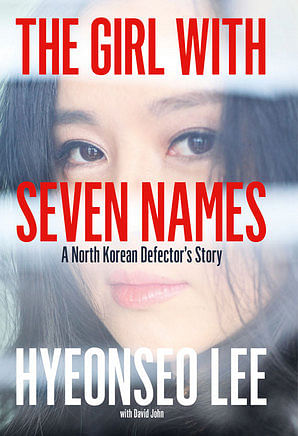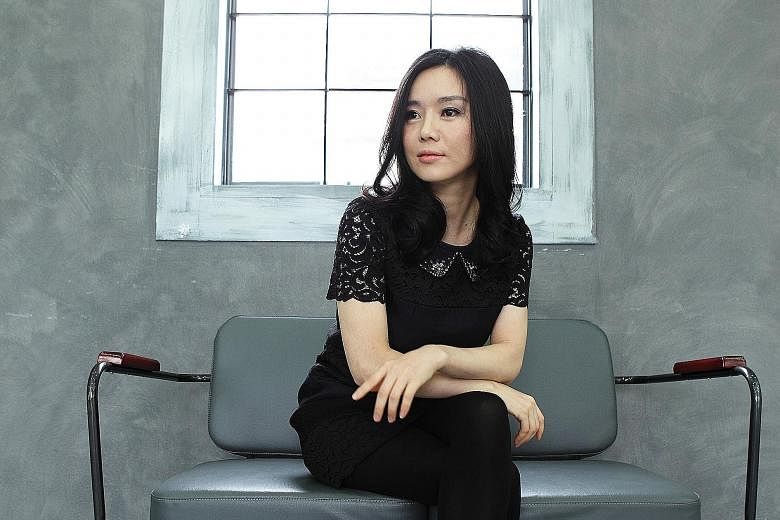In 1997, at age 17, Hyeonseo Lee walked out of North Korea. She crossed the frozen Yalu River into Changbai, China, which had been the city she looked out upon from her home in Hyesan, located in the northern part of North Korea.
She did not know then that it was the last time she would step foot in her home country.
There are memories that the Korean writer would prefer to expunge, but she revived them to write her new book, The Girl With Seven Names.
"I had to remember all the stories - some are good stories, but there are some I don't want to remember forever," she says, taking time off from her book tour in Chicago, United States, to speak to Life recently.
Though she did not elaborate, she could have been referring to multiple events during her many years on the run - there are instances of extortion, brutality, scams and imprisonment, among others.
"But I felt I had a responsibility to share my story. To make the regime collapse, we have to do something, we cannot be quiet," she continues.
Now 35, Lee lives in Seoul, South Korea, as its rightful citizen.
Her ordeal, as well as that of her mother and brother - whom she helped escape 12 years after her - is described in The Girl With Seven Names.
The title refers to the changes in identity she made over the years to evade arrest following her defection from the brutal communist regime under Kim Jong Il.
In the autobiography, she portrays her early life in North Korea and details her eventual escape to South Korea through China.
In recent years, Lee has emerged as an outspoken activist for North Korean human rights, even speaking about it at the United Nations Security Council.
A talk she gave to the Technology Entertainment and Design, or TED community in 2013 garnered more than four million views online, prompting American talk show host Oprah Winfrey to call it "the most inspirational TED talk ever".
Says Lee: "That talk changed my life. I didn't know the world would be interested in my story. I was actually freaking out because English isn't my native language."
The recent release of her book in more than 20 countries has made her well known worldwide. (It is banned in China, where North Korean defectors are still regarded as illegals).
However, she is not interested in becoming "some kind of celebrity", especially not if it will cause trouble for her relatives in North Korea.
In fact in her book, Lee, who graduated in English and Chinese from Seoul's Hankuk University of Foreign Studies, does not even reveal the identities of her mother, who in her early 60s, and brother, in his late 20s.
Lee, who is married to an American, is working on a new book about the real-life experiences of female North Korean defectors living in South Korea.
In speaking about the plight of North Koreans, she does not mince words.
"People like to make fun of North Korea, about Kim Jong Il's hair, for example. But they forget about the millions of innocent citizens still under the power of the dictator.
"They need outside help. They are seriously brainwashed human beings."
Even with her personal tale, Lee makes it clear that it is not truly a happy ending, as they are not allowed back in North Korea.
"My mum cries every day because she misses her siblings. This is the tragedy for all defectors. The answer is through the unification of both Koreas."
With The Girl With Seven Names, Lee could be attempting to rebuild her identity, which she says she still struggles with.
"Hyeon" means sunshine, while "seo" means good fortune in Korean.
"Of all my different names, this one is the most public. I hope this name is my last."
Fascinating and repulsive read of 'another universe'
THE GIRL WITH SEVEN NAMES
By Hyeonseo Lee
HarperCollins/Paperback/$28.89/ Books Kinokuniya/ 3.5/5 stars


"Leaving North Korea is not like leaving any other country. It is more like leaving another universe," writes Hyeonseo Lee in the first few pages of this book.
Indeed, to read this autobiographical tale is like going on a tour of another universe, even if you have read all the bizarre news stories that have been published regarding North Korea (such as leader Kim Jong Un executing his defence minister with an anti-aircraft gun for falling asleep at meetings).
You are by turns fascinated and repulsed, in shock or in disbelief, at how, for instance, 12-year-olds train for hours year-round holding up individual cards at mass games in order to form a larger picture.
As there were no toilet breaks, the children would sometimes wet themselves on the field and lived in fear of making a mistake.
"In other words, though we were too young to know it, mass games helped to suppress individual thought," Lee writes.
Strangely enough, she did not mean to defect .
She had crossed a frozen Yalu River behind her house into Changbai, China, at 17, an act of temporary rebelliousness.
But then her mother told her she could not come back, for fear of reprisals. Family members of defectors left behind continue to be harassed by police, and are often forced to move or made to give bribes in order to be left alone.
Her journey to a new life in Seoul, South Korea, is fraught with difficulty - she was attacked by mysterious assailants, interrogated by suspecting police and cheated of her money by dodgy brokers promising to get her safely across China, among other things.
After all of that, 11 years after arriving safely in South Korea, she returns to Changbai, on the other side of the Yalu River, to help her mother and brother escape through China and Laos.
The book is immensely readable, packed as it is with action and loads of twists that engage the reader from start to finish.
But more than that, it is full of quiet observations that give the story its emotional heart. These are most keenly felt in the beginning of the book, when a young Lee starts having doubts about her country and leaders.
At age 14, she gets into trouble in school for wearing a pink Chinese coat and permed hair, while other students wore uniforms. Later, she realises that her rebellion was a "symptom of a deeper and general disillusionment I was feeling".
This might be typical for a teenager living elsewhere in the world, but that type of social awakening must not be common in a homogeneous society where all media and entertainment is under state control.
The Girl With Seven Names - the title itself sounds like it belongs to a children's storybook - refers to how Lee had to keep changing her identity, mainly to escape punishment for leaving a country she was supposed to think was the greatest in the world.
So it is no surprise that the theme of identity is strong in the book.
When Lee is in China, she pretends to be Korean-Chinese. However, she never seems to be able to run away from her true identity, happy to find fellow defectors in real life and online.
And when she finally makes it to South Korea, where she is now a human rights activist and writer, she realises that she needs her family with her in order to be happy. Though separated for 12 years, it is her link to her family that is the connective tissue in the story.
The ending of the book is both happy and sad, a state of limbo as a hopeful Lee dreams of a united Korea.
If you like this, read: Dear Leader by Jang Jin-Sung (2015, 37 Ink, paperback, $26.75 from Books Kinokuniya), a fascinating account of an ex-poet laureate and propagandist in the North Korean regime under former leader Kim Jong Il.


